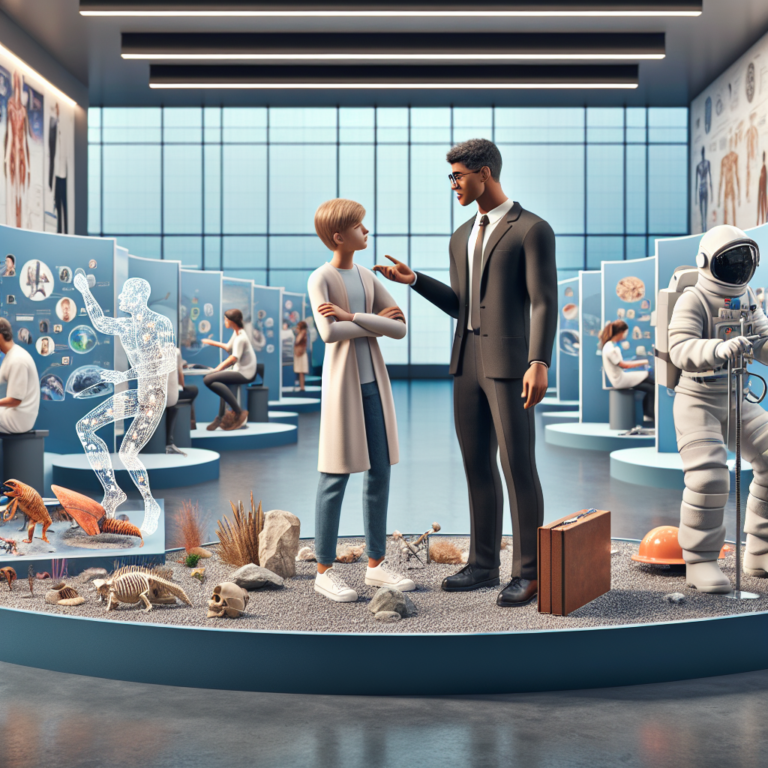Expert Advice for Career Development Strategies
Navigating the professional landscape can be a daunting task. Career development is a continuous journey, not a destination.
Understanding and implementing effective career development strategies is crucial. It can shape your professional trajectory and open doors to new opportunities.
This article aims to provide comprehensive advice on career development strategies. From self-assessment to setting SMART career goals, we delve into various facets of career planning and advancement.
Whether you’re a recent graduate seeking guidance or a mid-career professional looking to pivot, this article offers valuable insights. It provides actionable tips to enhance your professional growth and achieve your career aspirations.
Embark on this journey with us as we explore expert advice on career development strategies. Let’s unlock your potential and propel your career to new heights.
Understanding Career Development
Career development is a lifelong process. It involves managing learning, work, leisure, and transitions to move towards a personally determined and evolving preferred future.
It’s about more than just choosing a job. It’s about setting personal goals and strategizing how to achieve them.
Understanding career development requires introspection and self-assessment. It’s about identifying your interests, skills, values, and personality type, and aligning them with your career goals.
Moreover, it’s about being proactive and taking charge of your career trajectory. It’s about making informed decisions and setting realistic goals to achieve professional success.
The Importance of Self-Assessment
Self-assessment is the cornerstone of career development. It’s about understanding your strengths, weaknesses, interests, and values.
This introspection helps you identify careers that align with your skills and passions. It provides a clear direction and focus for your career planning efforts.
Moreover, self-assessment helps you understand your unique value proposition. It enables you to articulate your skills and experiences effectively to potential employers.
Setting SMART Career Goals
Setting career goals is a critical aspect of career development. But not just any goals – they need to be SMART.
SMART stands for Specific, Measurable, Achievable, Relevant, and Time-bound. These criteria ensure your goals are clear, realistic, and within reach.
Setting SMART career goals provides a roadmap for your career journey. It helps you stay focused, motivated, and accountable, propelling you towards your desired career outcomes.
Continuous Learning and Upskilling
In today’s rapidly evolving job market, continuous learning and upskilling are crucial. They are key to staying relevant and competitive in your chosen field.
Upskilling involves acquiring new and relevant skills beyond your current qualifications. It’s about expanding your skillset and enhancing your professional capabilities.
Continuous learning, on the other hand, is about staying updated with the latest trends, technologies, and best practices in your industry. It’s about being a lifelong learner, always ready to adapt and grow.
Embracing Professional Development
Professional development is an ongoing process. It’s about constantly improving your skills and knowledge to advance in your career.
This could involve attending workshops, seminars, or conferences. It could also mean pursuing further education or obtaining industry-specific certifications.
Embracing professional development not only enhances your career prospects but also boosts your confidence and credibility in the workplace.
Leveraging Online Platforms for Learning
In the digital age, online platforms offer a wealth of learning opportunities. They provide easy access to a wide range of courses and resources across various fields.
Platforms like Coursera, Udemy, and LinkedIn Learning offer courses taught by industry experts. These courses can help you acquire new skills or deepen your existing knowledge.
Moreover, these platforms often provide certificates upon course completion. These certificates can be added to your resume or LinkedIn profile, showcasing your commitment to continuous learning and professional growth.
Networking: A Keystone for Career Advancement
Networking is a powerful tool for career advancement. It’s about building and nurturing professional relationships that can open doors to new opportunities.
A strong network can provide valuable insights, advice, and resources. It can also lead to job referrals, collaborations, or partnerships.
Moreover, networking is not just about taking. It’s about giving as well. It’s about sharing your knowledge, expertise, and resources to help others in their career journey.
Strategies for Effective Networking
Effective networking requires a strategic and intentional approach. It’s not about collecting business cards or adding connections on LinkedIn.
One strategy is to attend industry events, seminars, or conferences. These platforms provide opportunities to meet industry professionals and thought leaders.
Another strategy is to join professional associations or groups related to your field. These platforms provide opportunities for learning, networking, and professional development.
Utilizing LinkedIn for Professional Growth
LinkedIn is a powerful platform for professional networking and career development. It’s a platform where you can showcase your skills, experiences, and achievements.
One way to leverage LinkedIn is by actively participating in relevant groups or discussions. This can help you establish your thought leadership and expand your network.
Another way is to regularly update your profile and share valuable content. This can help you stay visible and relevant in your network, increasing your chances of being noticed by potential employers or partners.
The Role of Mentorship in Career Development
Mentorship plays a crucial role in career development. A mentor can provide guidance, advice, and support based on their own experiences and expertise.
Having a mentor can accelerate your career growth. They can help you navigate challenges, make informed decisions, and gain valuable insights into your industry or field. A mentor can also provide feedback, encouragement, and motivation to help you reach your career goals.
Mastering Job Application Tools
Job application tools are essential for career development. They are the first point of contact between you and potential employers.
A well-crafted resume and cover letter can set you apart from other candidates. They provide an opportunity to showcase your skills, experiences, and achievements.
Job interviews, on the other hand, allow you to demonstrate your interpersonal skills. They also give you a chance to express your enthusiasm for the role and the company.
Crafting a Compelling Resume and Cover Letter
Your resume and cover letter should be tailored to each job application. They should highlight your relevant skills and experiences.
A compelling resume and cover letter can capture the attention of hiring managers. They can make a strong case for why you are the best candidate for the job.
Acing Job Interviews
Job interviews can be nerve-wracking. However, with proper preparation, you can ace them.
Research the company and the role beforehand. Practice answering common interview questions. On the day of the interview, dress appropriately and arrive on time. Remember to be confident, articulate, and professional.
Negotiation Skills for Career Advancement
Negotiation skills are crucial for career advancement. They can help you secure better job offers, higher salaries, and improved working conditions.
To negotiate effectively, you need to do your research. Understand the market rate for your role and industry. Be prepared to articulate your value and contributions. Remember, negotiation is a two-way process. Be open to compromise and aim for a win-win outcome.
Overcoming Career Obstacles
Career obstacles are inevitable. They can range from job loss, career transitions, to dealing with difficult colleagues. However, these challenges can also serve as opportunities for growth and learning.
The key to overcoming career obstacles is resilience. This involves maintaining a positive mindset, learning from failures, and staying adaptable to change. It’s also important to seek support when needed, whether from mentors, career coaches, or professional networks.
Remember, every successful professional has faced and overcome obstacles in their career. It’s how you respond to these challenges that defines your career trajectory.
Dealing with Common Career Challenges
Career challenges can vary widely. Some people may struggle with job search, while others may face difficulties in career progression. It’s important to identify these challenges early and develop strategies to address them.
For instance, if you’re struggling with job search, consider seeking employment help or improving your job application tools. If career progression is your challenge, consider upskilling or seeking mentorship. Remember, every challenge is surmountable with the right strategy and mindset.
Work-Life Integration for Long-Term Success
Work-life integration is crucial for long-term career success. It’s about finding a balance between your professional responsibilities and personal life. This balance can help prevent burnout and enhance overall job satisfaction.
To achieve work-life integration, consider setting boundaries, prioritizing tasks, and practicing self-care. It’s also important to cultivate hobbies and interests outside of work. Remember, a fulfilling career is not just about professional success, but also personal well-being.
Personal Branding and Its Impact on Your Career
Personal branding is a powerful tool in career development. It’s about defining and communicating your unique value proposition to potential employers, clients, or colleagues. A strong personal brand can open doors to new opportunities and enhance your professional reputation.
To build your personal brand, consider your strengths, passions, and career goals. Then, communicate these through various channels, such as LinkedIn, personal website, or networking events. Remember, your personal brand should be authentic, consistent, and aligned with your professional goals. It’s not just about self-promotion, but about showcasing your unique value in the job market.
Conclusion: Creating a Sustainable Career Development Plan
In conclusion, career development is a continuous, lifelong process. It requires self-assessment, goal setting, continuous learning, networking, and overcoming obstacles. By implementing the strategies discussed in this article, you can create a sustainable career development plan that aligns with your professional goals and aspirations.
Remember, career development is not a linear path. It’s normal to experience setbacks, changes, and uncertainties along the way. The key is to stay adaptable, resilient, and committed to your professional growth. Seek support when needed, whether it’s from a mentor, career coach, or professional network.
Finally, always keep learning and growing. The job market is constantly evolving, and so should your skills and knowledge. By staying curious, open-minded, and proactive in your career development, you can navigate the complexities of the job market and achieve long-term career success.








